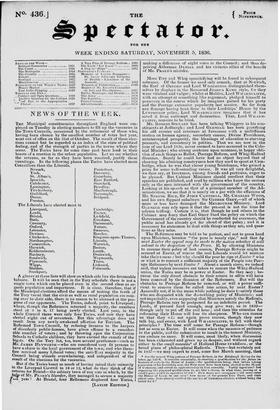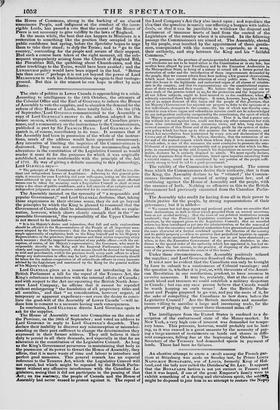More Tory and Whig speechifying will be found in subsequent
columns. Of the former we need only remark, that at Norwich, the Earl of ORFORD and Lord WODEHOUSE distinguished them- selves by displays in the Reverend JOSHUA KING style, fir they were virulent and vulgar; whilst at Halifax, Lord Wit ARNCLIFFE, with an attempt at something like argument, pledged himself to persevere in the course which he imagines gained for his party and the Peerage extensive popularity last sessicn. So far from any damage having been done to their Lordships' House by the LYNDHURST policy, Lord WHARNCLIFFE imagines that it has saved it from contempt and destruction. That, Lord \VIIARN- CLIFFS, remains to be tried.
Mr. ROBERT STEUART has been talking Whiggery to his con- stituents at Jedburgh ; and Lord GLENELG has been gratifying his old cronies and retainers at Inverness with a mellifluous oration on human agency, secondary causes, Divine Providence, uninterrupted prosperity, the blessings of education to starving peasants, and consistency in politics. That we are now in the year of our Lord 1836, never seemed to have occurred to the Colo- nial Minister; who strung sentence upon sentence, in happy obli- vion of sua things as Ballot, Peerage Reform, and Whig-Radical disunion. Surely he could have had no object beyond that of showing his admiring countrymen how they used to spout at Cam- bridge, when he was that clever young Scotchman, who gained a prize for some well-sounding verses. It was all very delightful, we dare say, at Inverness, among friends and partisans. eager to be pleased. But Cabinet Ministers should recollect that their speeches are published, and read by millions who know the orators only as the men intrusted with the government of the country. Looking at his speech as that of a principal member of the Ad- ministration, we see that it is nearly on a par with the effusions of Mr. SPRING RICE, Sir JOHN CAMPBELL, Mr. CHARLES WOOD, and his own flippant subaltern Sir GEORGE GREY,—all of which more or less have damaged the MELBOURNE Ministry. Lord GLENELG may rely upon it that the present is not the time for solemn trifling. Certain it is, that though he and others in the Cabinet may fancy that Earl GREY fixed the policy on which the Government of the country should be conducted for evermore, the public mind has already got far ahead of that policy ; and it is necessary for statesmen to deal with things as they are, and guess lions as they arise. The Reformers may be told to be patient, and not to press hard
upon Ministers, because " the pear is nearly ripe," and that by nest Easter the appeal may be made to the nation whether it will submit to the despotism 91 the Peers. If, by allowing Ministers
to resume their policy of last session, Peerage Reform might be secured at Easter, of course the real Liberals would let matters
take their course : but why should the pear be ripe at Easter? who
or what is to convert a sufficient majority of the People into Peer-
age Reformers by next Easter ? About a month since, we indeed
said, that unless measures are taken to restore the Whig-Radical
union, the Tories may be in power at Easter. So they may; be- cause the only direct obstacle to their return to office will have been removed by the disunion of the Reformers. But will the obstacles to Peerage Reform be removed, or will a power suffi- cient to remove them be called into action, by next Easter? Assuredly not, if in the mean while nothing be done to satisfy those who are disgusted with the do-nothing policy of Ministers; and not improbably, even supposing that Ministers satisfy the Radicals, Peerage Reform may be postponed for an indefinite period. The Lords, if pressed hard enough, may give way, as in 1832— though only to put off the evil hour ; and then the stimulus for reforming their House will lose its sharpness. Who can insure us that they will not again prove craven, though they now talk big, and swear, with Lord WHARNCLIFFE, to fall with their principles ? The time will come for Peerage Reform—though not so soon as Easter. It will come when the measure of patience in the public, and the submission to insult in the tamest Ministry, can endure no more. It will come, most likely, when discussion has been exhausted and given up in despair, and without regard either to the small conceits* of Holland House twaddlers. or the broad plans of philosophical Radicals. Then—but certainly not in 1837—we may expect to read, some fine March morning, that • See the newest Whig pattern of Peerage Reform, io the Edinburgh Reeete for Oc- tober, pp. 245-6. It consists, essentially, in exacting a qualification for the future in- heritors of seats in the House of Lords„—the qualification being, that before taking possession or his hereditary seat, the Peer must have been twice elected to the House of Commons, and served an apprenticeship in that assembly. Vastly ingenious t but supposing the proposed qualification to act like a charm, in what time, moving at a snail's pace, wculd its operation be felt ? How many new occupants of old seats enter
the House of Lords in one year? how many of the present Tory Peers, and their eldest sons. have already received the unction of Commons election, without being the better for it
the House of Commons, strong in the backing of an almost unanimous People, and indignant at the conduct of the incor- rigible Lords, has passed a vote that the assent of the House of Peers is not necessary to give validity to the laws orEngland. In the mean while, the best that can happen to Ministers is a restoration to something like the position they occupied in the public confidence last spring, before the Spectator began to urge them to take their stand; to defy the Tories; and to " go to the country," contending for the people and secure of their support. Had such a course been taken at the right moment, all the sub- sequent unpopularity arising from the Church of England Bill, the Pluralities Bill, the quibbling about Church-rates, and the other trucklings to the Tories, would have been avoided ; and the LYNDHURST policy would have been nipped in the bud. "Better late than never :" perhaps it is not yet beyond the power of Lord MELBOURNE to work his Administration up again to that vantage- ground. But this is the utmost he can hope to effect by next Easter.



























